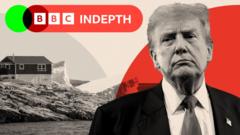President Trump's recent imposition of significant tariffs on major trade partners, including Canada, Mexico, and China, has sparked concern among economists and lawmakers, warning of potential inflation and shifts in global economic power dynamics.
Trump’s Tariff Strategy Raises Alarms Over Global Trade Dynamics

Trump’s Tariff Strategy Raises Alarms Over Global Trade Dynamics
Widespread criticism erupts as President Trump's new tariffs threaten to disrupt international trading relationships and are poised to reshape economic alliances.
President Trump’s recent decision to impose extensive tariffs on Canada, Mexico, and China is stirring significant unrest within the global trading framework, leading many to fear a potential dismantling of the carefully structured international economic order. As President Trump rolled out these tariffs through executive orders, the rapid implementation drew fierce backlash from various lawmakers, economists, and business leaders, who condemned the action as reckless economic policy. They voiced alarm that this move, ostensibly aimed at addressing issues related to fentanyl trafficking and illegal immigration, could drive up inflation, hinder American industries, and inadvertently bolster China’s position as a key player in global trade.
In a defensive statement released on social media, Trump acknowledged the possibility of adverse consequences, stating, “WILL THERE BE SOME PAIN? YES, MAYBE (AND MAYBE NOT!).” The new tariffs, effective from Tuesday morning, impose a 25 percent tax on most imports from Canada and Mexico, while energy products from Canada will receive a slightly reduced tariff of 10 percent. Goods imported from China are met with a 10 percent levy.
Both Canada and Mexico have reacted promptly, threatening to enforce their own tariffs in retaliation, while Chinese authorities hinted at potential “countermeasures” to protect their economic interests. In a Sunday interview with NewsNation, Trump’s senior trade advisor, Peter Navarro, downplayed the likelihood of any last-minute interventions that could stop the tariffs from taking effect. As international stakeholders digest the implications of this profound policy shift, the potential for a reshuffling of global economic alignments remains a pressing concern.























